
General_English_Semester_1_New_LAST_LAST_doc
.pdf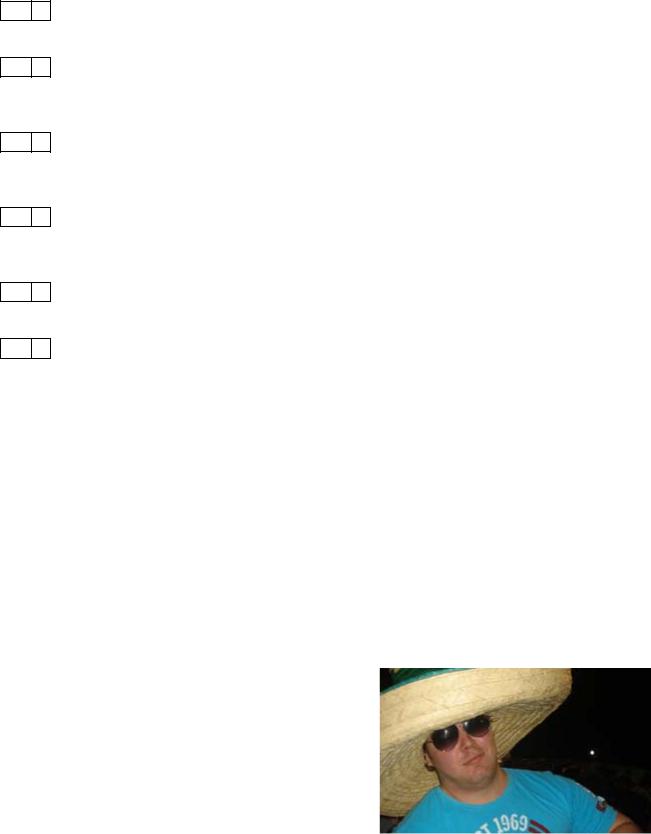
- There are many types of cultural locations and events. You can go to the museum, to an art gallery or to the zoo to see animals from around the world. You can go to concerts, plays, musicals, dance recitals and opera performances.
13
- Many people like to go to shopping malls and areas of the city that are known for shopping to buy clothes or items for their houses and gardens.
14
- Many people like to cook different types of food. You can make meals for breakfast, lunch and dinner. You can bake cakes, cookies, slices and pastries in the oven. Some people boast that they have a special recipe - ask them to cook it for you!
15
- There are many things that you can study just because you find it interesting! You can study a language; you can learn a skill, such as cooking or making furniture; or you can even study the hieroglyphs of the ancient Egyptians, if you want to!
16
- There are many, many arts and crafts that you can learn and practice. You can paint, draw, sew, crochet, knit, sculpt, engrave, make furniture, make jewelry, or you can even create your own new art form!
17
- You can plant flowers, vegetables or herbs and maintain your garden by watering it, pulling the weeds and feeding it with fertilizer.
18
- To stay fit and healthy, you can do exercise alone, such as swimming or working out at a gym, or you can play a team sport, such as football or basketball.
From http://www.vocabulary.cl/Lists/Free_Time_Activities.htm
Speaking
1.Choose one of the leisure activities and tell the group how people do it. Think which activity would you like to try.Why? Share your thoughts with the groupmates .
2.Interview four groupmates about their favourite free time activities and complete the table.
3.Present the results of the survey in you group.
Student’s Names |
What do you like doing |
When do you …? |
Why do you like …? |
|
in your free time |
|
|
|
|
|
|
|
|
|
|
|
|
|
|
|
|
|
|
Discussion
1.Has your life changed dramatically after you became a University student?
2. What is your typical day like? Read how Adam spends his day. Mind the style of the text. It is a sample of colloquial speech, that is used by the youth. Pont out colloquial words and word combitations.
63

9:00am ALARM SOUNDS – What? Oh it's only 9 *hits snooze* zzz … zzzz 10:00am Wake Up. I love living on campus … it's only a 5 minute walk to class. Have
shower and grab an apple as I head out.
First class – Software Engineering 252. Learning how to apply engineering principles to software design. Doesn't sound too interesting, but the lecturer makes it good, challenging us with real world situations.
11:00am Grab a kebab from Georges … so worth it : D Head into the Future Students Centre to catch up with some friends in the Student Ambassador Program and send a few emails (or Facebook)
1:00pm Tutorial on Database Systems 252. Learning how to set up these things is hard - no wonder Google makes so much money. Still I'm making some progress, using Oracle and other industry tools.
2:00pm Gym … Time to fight the flab! Or maybe just do some weights. I am sooo not in the mood for the treadmill.
3:00pm Head home, chill out and make some afternoon tea. Catch up with roomies and see how there day was. Sounds like we are all heading out on the weekend. Sweet!
4:00pm Start work. I work at Curtin's housing department as well, it's such a sweet job. Do some readings for my classes next week while waiting for someone to lock themselves out of their room.
5:00pm Work continues. It didn't take long … first lock out. Watching TV in the office sprawled out on the couch.
6:00 - Work continues. Sweet! My database actually works! Oh wait … maybe not. Send 8:00pm email to tutor about it.
9:00pm Finishing up at work, not too bad, only 3 lock outs. And I got my readings done. Not too shabby at all.
10:00pm Head home, check Facebook.
(From http://futurestudents.curtin.edu.au/student-life/workload/typical-day-at-uni/adam-w.cfm)
3.Describe your typical day as a university student. Grammar spot
1.Study the difference between make and do.
Make |
Do |
(smth that didn’t exist before) |
(an activity, an action) |
make the bed |
do housework |
make the cake |
do homework |
make dinner |
do washing up |
make coffee |
do shopping |
make a mess |
do cleaning |
make a wish |
do well |
make plans |
do badly |
make a decision |
do good |
make a mistake |
do smb a favour |
make noise |
do make-up |
make money (earn) |
do business |
make an excuse |
do a course |
make a wish |
do exercises |
64
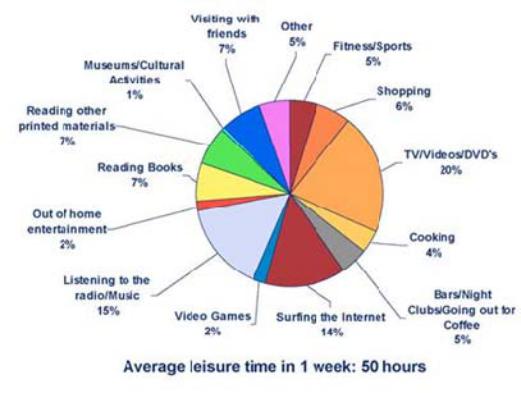
2.Make up sentences using active vocabulary.
3.Present perfect simple vs simple past
Put the verbs in parentheses into the present perfect or the simple past.
Alan: Hi, Brian! 1) ______________________ (you/ever/try) sandboarding? Brian: No, I 2) _______________________ (not/do) it, but I’d like to.
Alan: Me too. My brother 3) _________________ (go) on a trip to Dubai last year and did it.
Brian: Really? 4) ________________ (he/like) it?
Alan: He 5) ______________ (love) it! He 6) _______________ (not/stop) talking about it since he 7) ______________ (get) back.
Brian: Wow! 8) ______________ (be/it) expensive?
Alan: Not really. He 9) ______________ (already/plan) his trip for next year. He can’t wait to go back!
Brian: Maybe we should go with him, too!
Project work
1.Study the results of the survey about type and time of leisure activities. Guess the country.
2.Surf the Internet to find how young people from different countries spent their free time. Point out differences and similarities
65

Module 2. International Communication
Unit 1. Communication in the Globalized World
Lead-in
Do you agree that the number of international contacts is obviously increasing or mass media exaggerate the importance of global communication? Give your reason.
Is globalization the tool to open the doors into the universal cultural, educational, scientific, and business common space or that’s the way to lose the national integrity and disappear as a nation? Prove your idea.
Do you share the opinion that knowing a foreign language is a tool that helps to survive in a “global village”? Dwell upon it.
Is bilingualism or further multilingualism a necessary requirement for a modern person who wants to achieve success? Does the ability to speak several foreign languages increase a personal competitiveness while searching for a job?
Can language ignorance cause problems while visiting a foreign country? Give some examples.
How many and what languages do you want to learn to speak? Explain your choice.
Reading
1. Read the following quotations about learning foreign languages. Develop the ideas suggested by the authors.
“Knowledge of languages is the doorway to wisdom.” Roger Bacon (English Franciscan philosopher and educational reformer)
“If you talk to a man in a language he understands, that goes to his head. If you talk to him in his own language, that goes to his heart.” Nelson Mandel (South African politician and a antiapartheid activist)
“Language is the means of getting an idea from my brain into yours without surgery. Mark Amidon (Popular American blogger)
“If you can speak three languages you're trilingual. If you can speak two languages you're bilingual. If you can speak only one language you're an American.” Author Unknown
“Learn a new language and get a new soul.” Czech Proverb
Reading and vocabulary
1. Read the definition of the communication phenomenon from Wikipedia. Translate into Russian.
Communication is the exchange of thoughts, messages, or information, as by speech, visuals, signals, writing, or behavior.
This word is derived from the Latin word "communis" which means to share. Communication requires a sender, a message, and a recipient, although the receiver need not be present or aware of the sender's intent to communicate at the time of communication; thus communication can occur across vast distances in time and space.
66
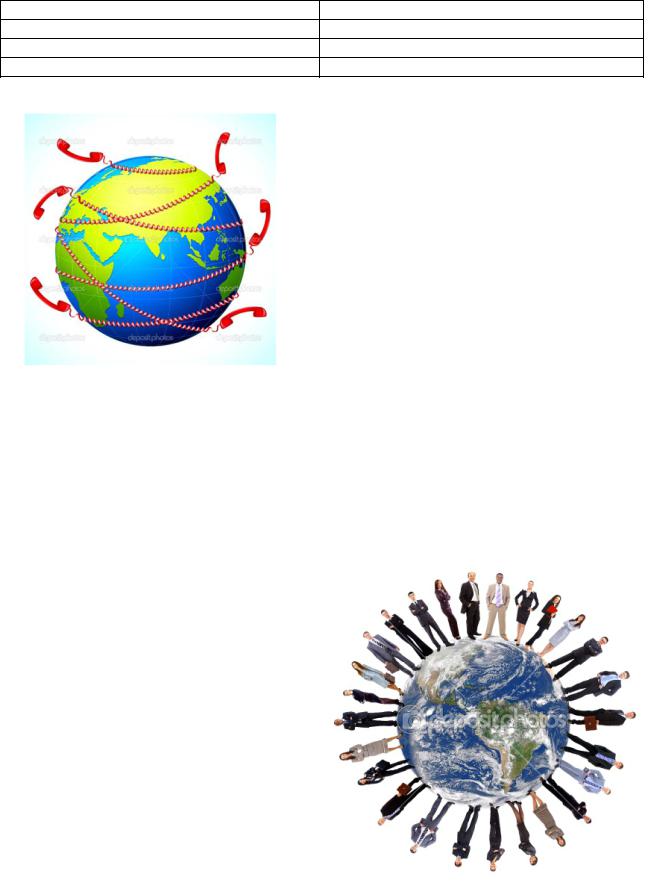
2. Try to give your own explanation to the notion of communication. Emphasize the ultimate purpose of communication. You may find useful the following basic ideas:
It’s a process of …. |
to reach mutual understanding |
This is the way to …. |
to share ideas |
It’s a system of …. |
to inform about one’s plans and intentions |
That’s the tool to …. |
to gain some profit. |
3. Scan the text for general understanding. What it is about? Think of the title to the text.
The world is a global village. Over the last few decades, scientific progress and technological innovations have made it possible for people all around the world to be in touch 24/7. Companies and organizations are increasingly expanding beyond the borders of their own countries.
Modern people have so many exciting opportunities that were beyond the wildest dreams of their parents. With an instant click a Russian student can attend a webinar delivered by an outstanding professor from Oxford, anti-crisis managers from different departments of an international corporation can create a think-tank via Skype to brainstorm genuine ideas to
help the company survive, young band musicians can post their songs on Internet to attract some sponsors from foreign countries, senior students can find international grants and internships for their projects or search for a job offer to participate in the Work&Travel Program. Chances are really infinite!
Global communication at the turn of the 21st century has brought about many effects. It is destroying technological, economic, political, and cultural boundaries. Print, photography, film, telephone and telegraphy, broadcasting, satellites, and computer technologies are quickly merging into a digital stream of a binary system of zeros and ones in the global telecommunications networks which violate national borders by broadcasting foreign news, entertainment, educational, and advertising programs.
Worldwide communication gives a modern man an eyewitness view of events in remotest locations; we participate in political events of global, regional or even local importance, besides we tend to share different knowledge, values and ethics, aesthetics, lifestyles which are based on global contacts.
Economically, separate industries are joining to service the new global environment; the expansion of WTO comes to mind here as a graphic example. Politically, global communication is undermining the traditional boundaries and sovereignties of nations. So, in order to meet the requirements of new technologically advanced reality people should interact much closer and intensify international contacts.
International communication has its own history. News have already been 'inter-
67
nationalized' in the fifteenth century: the wheat traders of Venice, the silver traders of Antwerp, the merchants of Nuremberg and their trading partners shared economic newsletters and created common values and beliefs in the rights of capital. The commercialization of mass print media (due to steam engine technology) has led to internationally operating news agencies (Reuters, Associated Press, AFP) in the nineteenth century. World wire and cable systems allowed international communication between France, Germany and Great Britain to their colonies in Africa and Asia. Transnational media organizations such as Intelsat, BBC, founded in the middle of the 20th century were the starting point for a new idea of international communication. It was the establishment of internationally operating media systems, such as CNN and MTV by individual companies which have finally opened a new age of global communication by distributing the same program "around the world in thirty minutes" (as a CNN slogan states) - across nations and cultures.
The moon landing, broadcast 'live' worldwide, was indeed a large step for mankind: simply because for the first time Planet Earth was seen as a common habitat, without borders, a blue planet of landmasses and oceans. The idea of the 'world' seemed to have switched from a metaphysical concept into a material reality, and finally has become the basis for such phenomenon as "Globalization."
4. Read the text in detail paragraph by paragraph. Find the topic sentence in each paragraph. Pay special attention to the word combinations in bold. Translate them.
5.Explain in English by matching A and B parts. Translate
|
|
A |
|
B |
|
|
|
|
|
|
1) |
webinar |
a) |
to develop creative solutions to problems and generate bright |
|
|
|
new ideas |
|
|
|
|
|
|
|
2) |
think-tank |
b) |
an invitation for a potential employee to work for some or- |
|
|
|
ganization |
|
3) |
internship |
c) |
a limit, a border line that separates one thing from another |
|
|
|
|
|
|
4) |
to brainstorm |
d) |
to make something or someone become less effective, sure, |
|
|
|
|
or successful; to make something or someone weak by taking |
|
|
|
|
away a base or foundation |
|
|
|
|
|
|
5) |
to post |
e) |
a system of on-the-job training, a work-related learning ex- |
|
|
|
|
perience for individuals who wish to develop professional careers |
|
|
|
|
in a certain occupational field. They can last approximately three |
|
|
|
|
months up to a year |
|
6) |
job offer |
f) |
to grow stronger, to make bigger or wider in size, volume, or |
|
|
|
|
quantity |
|
7) |
network |
g) |
the area or environment where an organism or ecological |
|
|
|
|
community normally lives or occurs, the place where a person or |
|
|
|
|
thing is most likely to be found |
|
8) |
to undermine |
h) |
a short form for Web-based seminar which is a presentation, |
|
|
|
|
lecture, workshop or seminar transmitted over the Web. The key |
|
|
|
|
feature is its interactive elements – the ability to give, receive and |
|
|
|
|
discuss information |
|
9) |
boundary |
i) to transmit programs from a radio or television station |
||
|
|
|
|
|
|
10) habitat |
j) |
a complex, interconnected group or structure, or a system |
|
|
|
|
that transmits any combination of voice, video and/or data be- |
|
|
|
|
tween users, or a group of people with similar interests who in- |
|
68
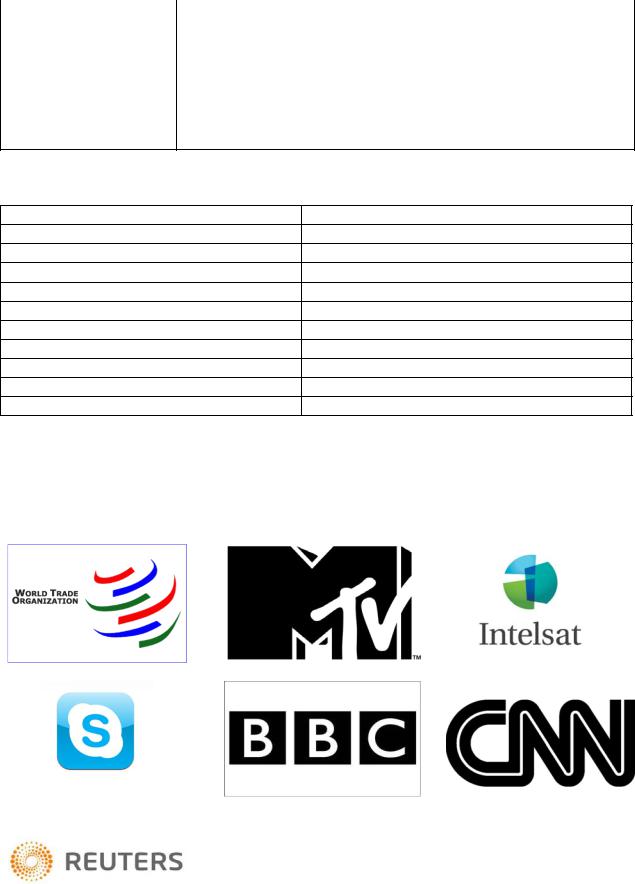
|
|
teract and remain in informal contact for mutual assistance or |
|
|
support |
11) |
to broadcast |
k) a group or an institution organized for intensive research and |
|
|
solving of problems, especially in the areas of technology, social |
|
|
or political strategy |
12) |
to expand |
l) to display some information in a place of public view, make it |
|
|
available for access. |
6. Match the words from A and B columns to make collocations. Try to reproduce the sentences from the text. Translate into Russian
|
A |
|
B |
1) |
to deliver |
a) |
a think-tank |
2) |
to attract |
b) |
a new age |
3) |
to create |
c) |
a national border |
4) |
to post |
d) |
a song on Internet |
5) |
to share |
e) |
an internship |
6) |
to open |
f) |
a webinar |
7) |
to violate |
g) |
the moon landing |
8) |
to search for |
h) |
requirements |
9) |
to broadcast |
i) |
a sponsor |
10) to meet |
j) |
values and ideas |
|
7. Do you know what the acronyms from the text stand for? Explain their meaning. If necessary look up on the Internet. Match the names with the pictures where possible.
1) WTO; 2) CNN; 3) MTV; 4) Skype; 5) Intelsat; 6) BBC; 7)AFP; 8) Reuters; 9) Work&Travel; 10) 24/7
A) B) C)
D) E) F)
G)  H)
H)
69

What things from the list do you deal with in your life on a daily basis or quite regularly? How?
8. Form the nouns from the verbs below.
verb noun advertize
expand operate participate destroy broadcast merge organize distribute communicate
9. Read the text once again and answer the questions.
1)Why is the world compared to a global village? Not a town, or a settlement, or a neighborhood, or a family, whatever you call it? Give your reason.
2)What infinite chances in communication does a scientific progress offer for a modern man? You may complete the list of professionals or just usual people. For example, what are the profits for a top executive; or a student – an AIESEC participant; or a fitness instructor; or an ambitious Forex Market player, etc?
3)Which term is used in the text to represent the data flow in modern digital environment? Do you know why? If you hesitate to give an exact answer, read the following information: (Computers use a binary number system – which consists of only two digits, 0 and 1 – because they run on electricity. At any given point in an electrical system, at any given time, current is either flowing (a state that represents 1) or it is not (a state that represents 0). All things performed by a computer are done electrically, and must therefore be expressed by zeros and ones. In computer terms, each zero or one is called a bit. A string of eight bits is called a byte. A thousand bytes is a kilobyte, and a thousand of those is a megabyte, and a thousand of those is a gigabyte, which brings the lowly zeros and ones into a realm we can understand.)
4)What events in remote locations would you like to be an eyewitness to?
5)Give some facts from the history of international communication.
6)What are the other milestone events in the history of modern civilization except moon landing that triggered international communication?
10. Scan the text and pick up the key words that can help you to express its general idea. Give the summary.
Grammar spot
Present Continuous is used to denote an action in progress going on at the present moment as well as to emphasize continual processes.
Note: One should bear in mind that the notion the present moment can be regarded wider than the moment of speech. F.ex. I am reading a very interesting detective story.
1.In the text there are some sentences where Present Continuous is used. Point them out, analyze and translate into Russian.
2.Use the Present Continuous Tense to emphasize continual processes taking place in modern world.
70

1.Information technologies in modern society (to increase) … efficiency and productivity of “digital economies” providing a global platform over which people and organizations develop strategies, interact, communicate, collaborate and search for information.
2.International market (to expand) … constantly to bring nations together in order to survive global economic crisis.
3.International organizations (to seek) … talented students to provide internships and important support in their training.
4.Educational webinars (to improve) … significantly students' learning ability.
5.Some experts say that social networks (to destroy) … people’s social skills and ruin their personal lives.
Improve your study skills Developing writing strategies
Developing writing strategies
Types of compositions (from Reading & Writing TARGETS 3, Student’s Book by Virinia EvansJenny Dooley)
When you write a composition or an essay, you are often asked to write your answer in the form of an article, a report, a letter, etc.
ARTICLES are found in magazines and newspapers (e.g. school newspaper, magazine for young children, etc). All of the following may be written in the form of an article:
Descriptive compositions about people, places, objects, etc
Narrative descriptions or stories about real or imaginary events which happened in the pastDiscursive essays, about arguments concerning particular subjects, which include:
o opinion essays, giving your personal opinion
o for-and-against essays, giving the opposing arguments for both sides (e.g. pros v. cons). REPORTS are similar to articles but have a more formal, factual style, and each kind has its own special format and features. Compositions in the form of reports include:
News reports about recent events (e.g. accidents, earthquakes, etc), such as those found in newspapers
Assessment reports discussing the suitability of a person, a place, a proposed plan, etc
Reviews discussing a film, book, restaurant, etc and giving your opinion /recommendation. LETTERS are written to a specific person/group (e.g. your parents, the Town Council, etc) for a specific reason (e.g. to make a complaint, to apply for a job, etc). Compositions in this form include:
Friendly letters to people we know, usually about personal matters, in informal style
Formal letters to officials/managers/etc, about official/business matters, in formal style
Postcards to friends or relatives.
There are several other kinds of informative writing, each with its own format and features. (You are not often asked to write compositions in these forms.) They include:
Instructions on how to make, use or do something (e.g. bake a cake, operate a washing machine, etc).
Leaflets giving information, advice, etc
Public notices, warnings, etc
Advertisements and announcements
Memos, notes and other short messages.
71
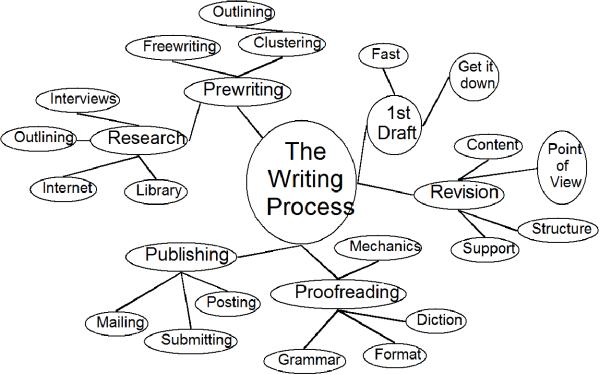
1. Write a letter to your friend where you share your feelings of being in a foreign country for quite a long time. You have participated in Work&Travel Program and gained a first-hand experience of living and working abroad. Highlight the following points in your letter:
fears, expectations and reality;
language barrier and the ways to overcome this difficulty;
communicating with foreigners on a daily basis: the most common problems;
being homesick and the ways of getting in touch with your relatives who are miles away;
finding friends;
your tips for a friend who will go to the US next summer by the same program.
Discussion
We all go through a very special period of time: modern world is divided into supporters of globalization, anti-globalization and even glocalization that is a mixture of 2 words: globalization and localization! But no matter what ideas you share it’s impossible to deny the importance of such phenomenon as globalization for international communication.
Share your ideas about globalization as a reality where we have to live in. What can you compare it to? Explain your choice. Below you can find some ideas.
a paradise;
a prison;
a runway for the boundless world;
a jungle, where rich countries are predators and poor countries are just prey;
a properly organized conveyor belt where every tool fits its place;
your choice.
72
